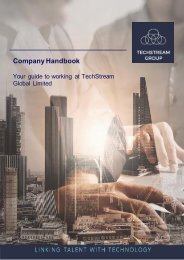20181119 BS EDITED TechStream Handbook WIP
You also want an ePaper? Increase the reach of your titles
YUMPU automatically turns print PDFs into web optimized ePapers that Google loves.
1.5.5 Managing Long-Term Sickness<br />
Long-term absence is when staff have not attended work for a continuous period of two weeks or<br />
more.<br />
Long-term absence may be specific and clearly defined or may be relatively non-specific and indefinite.<br />
Where an individual has, for example, a broken leg or has had an operation, there is normally a<br />
predictable end date to the absence after which they can be expected to return to work and resume<br />
a satisfactory attendance record. In such cases, it will not normally be necessary for managers to take<br />
action other than to remain in contact with the individual, which should be agreed by both the<br />
employee and manager ideally in advance.<br />
The more difficult situations are those where the cause of the illness is less well defined and the<br />
timescale for a return to work is unknown. This procedure is intended to enable managers to deal<br />
fairly and reasonably with such cases.<br />
1.5.6 Incapacity<br />
At 4 weeks of absence – consideration will be given if there is a reasonable expected return to work<br />
date and whether the absence is temporary or permanent. If there is no reasonable expectation of an<br />
imminent return to work, an Incapacity Hearing should take place.<br />
This Incapacity Hearing should follow the same process as a Disciplinary Hearing where the employee:<br />
• Is invited in writing<br />
• Is allowed to be internally represented<br />
• Is allowed to present any relevant evidence for consideration<br />
• Should be informed of any decisions of that meeting in writing.<br />
• The Chairperson of the Incapacity Hearing will consider whether or not the employee is capable<br />
of performing; and<br />
• if the employee is not capable –<br />
o<br />
o<br />
o<br />
the extent to which the employee is able to perform the work;<br />
the extent to which the employee’s work circumstances might be adapted to<br />
accommodate disability, or, where this is not possible, the extent to which the<br />
employee’s duties might be adapted; and<br />
the availability of any suitable alternative work.<br />
1.5.7 Medical Record Consent<br />
Reports from an employee’s GP or treating specialist can only be obtained with an individual's written<br />
permission. In the unlikely event that an employee refuses permission, managers will make decisions<br />
on such information as is available to them.<br />
<strong>TechStream</strong> Global Limited, Annexe A, Long Kloof Studios, Darters Road, Gardens, Cape Town, South Africa,<br />
8001 Tel: +27 (0) 21 422 0851 W: www.<strong>TechStream</strong>global.com<br />
Prod 03/2017. Page | 8






